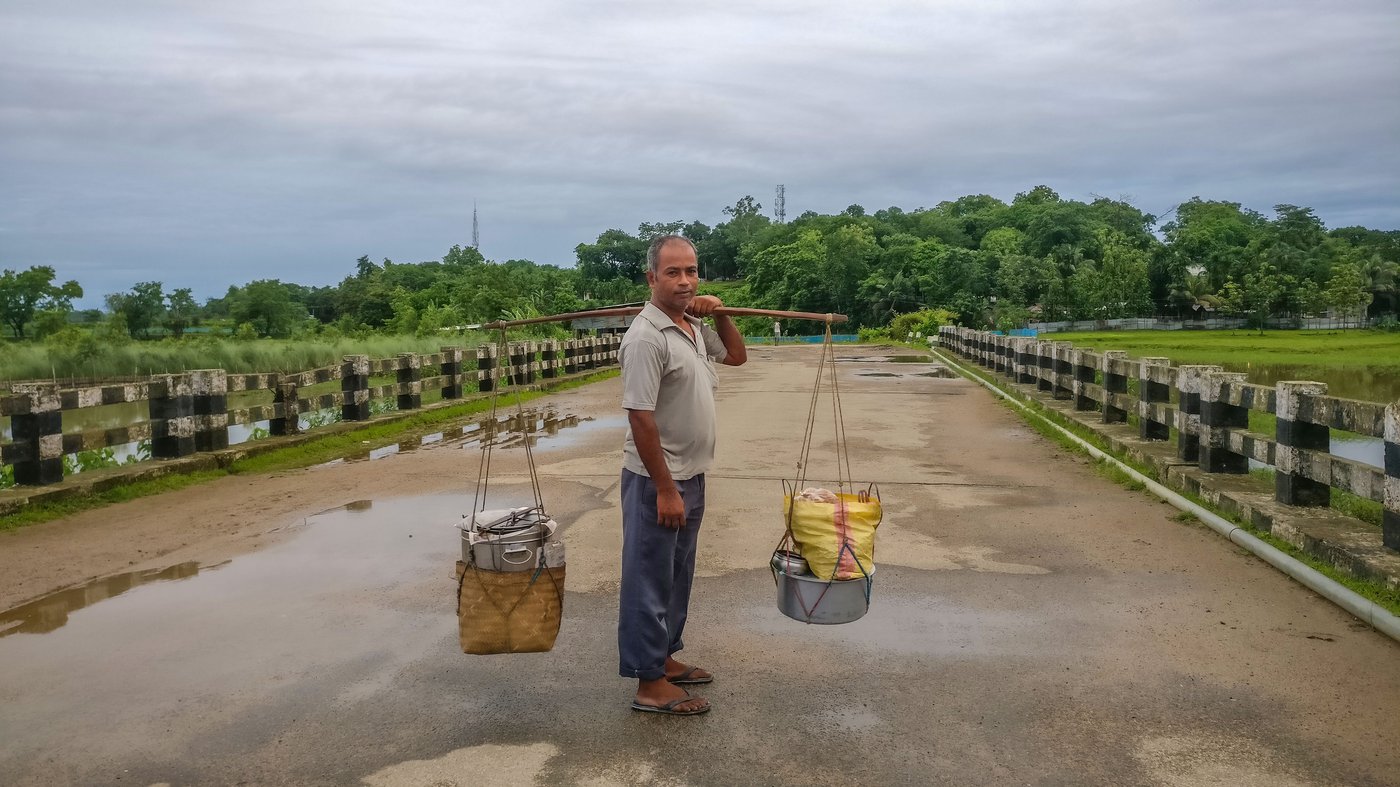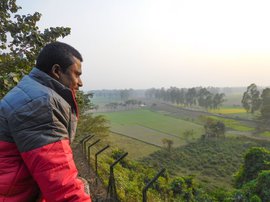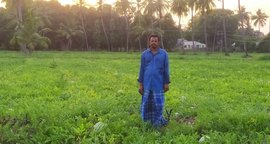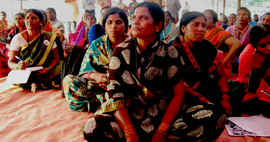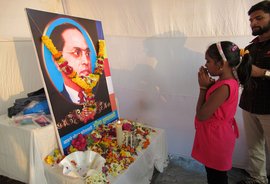Nosumuddin was crying. He was going far away for the first time – 10-12 kilometres from his own home, leaving behind his parents. At the age of seven this was really hard. “I felt very bad and cried. Leaving home and my family brought me to tears,” he recalls.
He was being sent away to work as a rakhal (cattle caretaker). “My family was very poor, my parents had no other option,” says Nosumuddin Sheikh, now 41 years old. “There was not enough food to feed us. We ate one meal most days, whatever grows freely in the field. Only few people in our village could afford two meals in those days.” An education was beyond his imagination: “I couldn’t think of going to school at that time. The condition of my family was so bad, how could we afford schooling?”
So he left his modest thatched hut in Urarbhui village in Assam’s (then) Dhubri district and went to Manullapara village by bus, travelling on Rs. 3 ticket to an employer who owned 7 cows and 12 bighas of land (around 4 acres). “Life as rakhal was very hard. I had to work for long hours at that age. Sometimes I was not given enough food or only stale food. I cried due to hunger,” Nosumuddin recalls. “Initially, I was not paid anything, given only meals and a space to sleep. My employer used to get 100-120 mon of rice every year. After four years, they began giving me two mon ” – around 80 kilos, at the end of the agricultural season from March to November.
Sending young boys in the family to work as rakhals used to be the practice until some decades ago in rural areas bordering Assam and Meghalaya. Children from poor families would be ‘given away’ by their parents to rich farmers to be ‘employed’ as cattle caretakers. The system was locally called petbhatti (literally, ‘feeding the stomach with rice’).
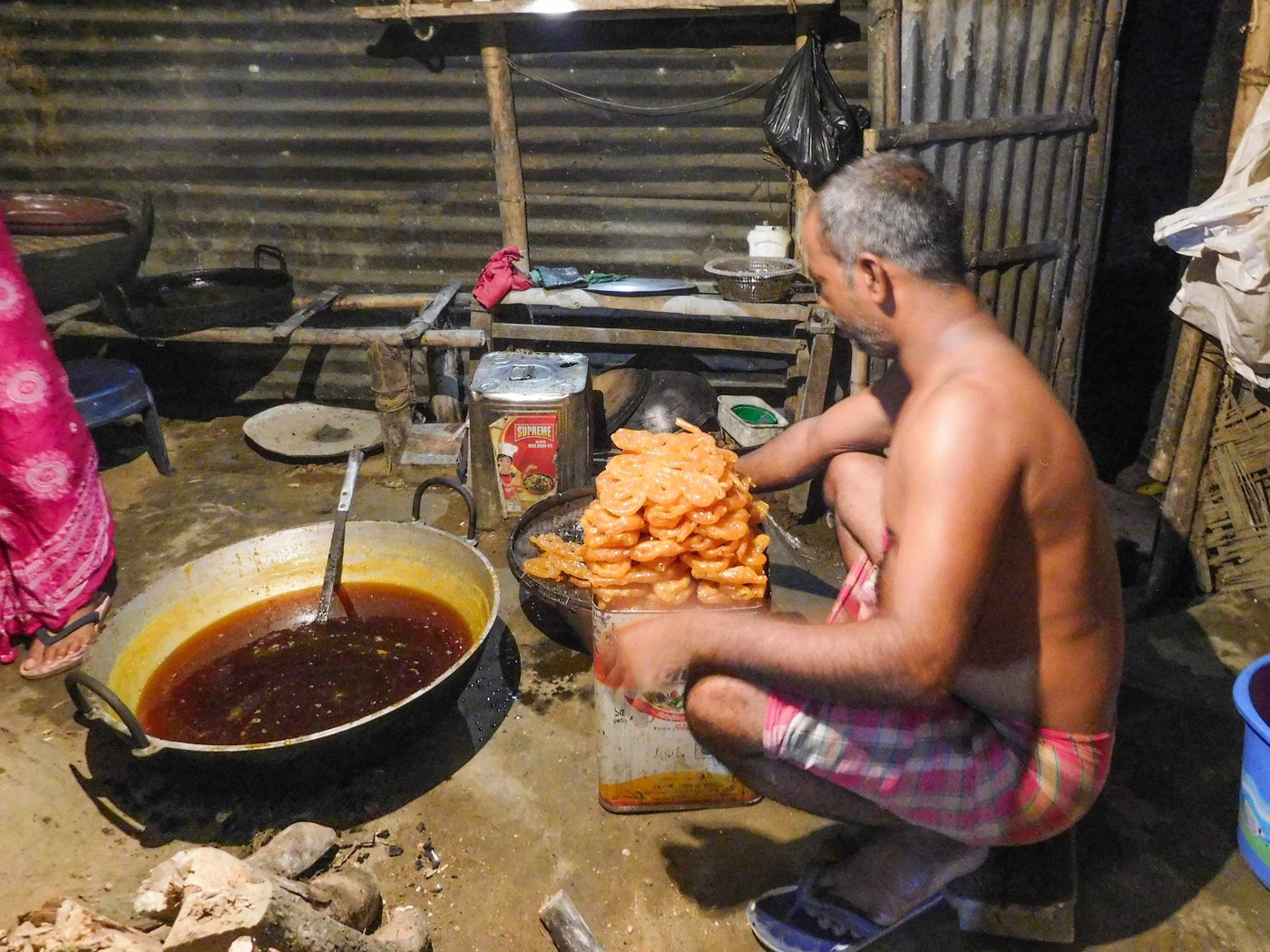
Nosumuddin starts preparing crunchy jalebis before dawn. Recalling his days as a cowherd, he says: ‘I would get tired working all day, and at night if not given enough food or given stale food, how would you feel? I felt helpless’
Nosumuddin’s two younger brothers too were sent to work as rakhals in their own village, Urarbhui. His father Hussain Ali (who passed away at the age of 80 last month), was a landless farmer who cultivated paddy on 7-8 bighas of leased lands under a crop-sharing system. (His mother Nosiron Khatun, a homemaker, died in 2018.)
Nosumuddin was hard-working. His day as a rakhal would start early, around 4 a.m. 'I used to get up during the morning prayer time,” he says.” He would mix straw with water and khol (mustard cake) as fodder, clean the cowshed, take the cows to the paddy field along with the landlord’s brothers. There, he would clear the grass, give water to the cows and complete other tasks. The daytime meals would be sent to the field. During the harvesting season, some days he would work in the field till late evening. “I would get tired working all day and at night if not given enough food or given stale food, how would you feel? I felt helpless.”
Often, sleeping on a pillow made of old clothes and a straw pallet on a bamboo cot in the cowshed, he spent the nights crying.
Every 2-3 months, he was allowed to go to his own village. “I could stay 2-3 days,” he says. “I always felt bad while leaving home again.”
When Nosumuddin was 15, his father changed his employer. This time he was sent to the house of a businessman-farmer in Manullapara village who had 30-35 bighas of land, a cloth shop and other businesses. “I was feeling homesick when going again to another new place and cried. Sodha Bepari [the new employer] introduced me to his family members and gave me 2 rupees as a gift. I bought chocolate later. That made me happy. After a few days I felt better and adjusted with them.”
Once again, food, a place to sleep in the cowshed and two sacks of rice at the end of the harvesting season, along with 400 rupees cash, was the ‘annual salary package’. His daily chores included cattle grazing and cleaning the cowshed. But life became a little better for Nosumuddin. He was now 15 and could work more efficiently. Moreover, he says, his employer was kind.
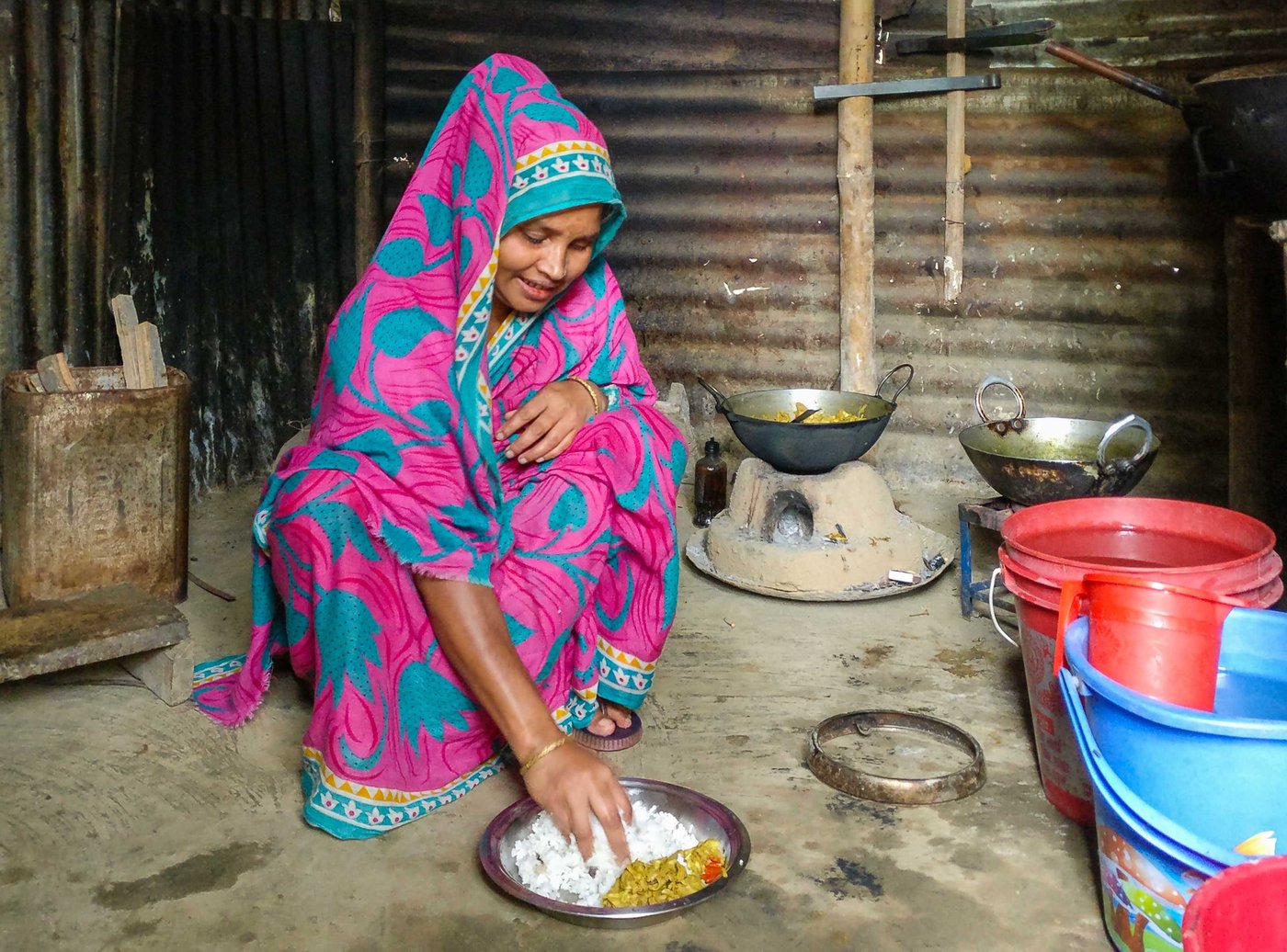
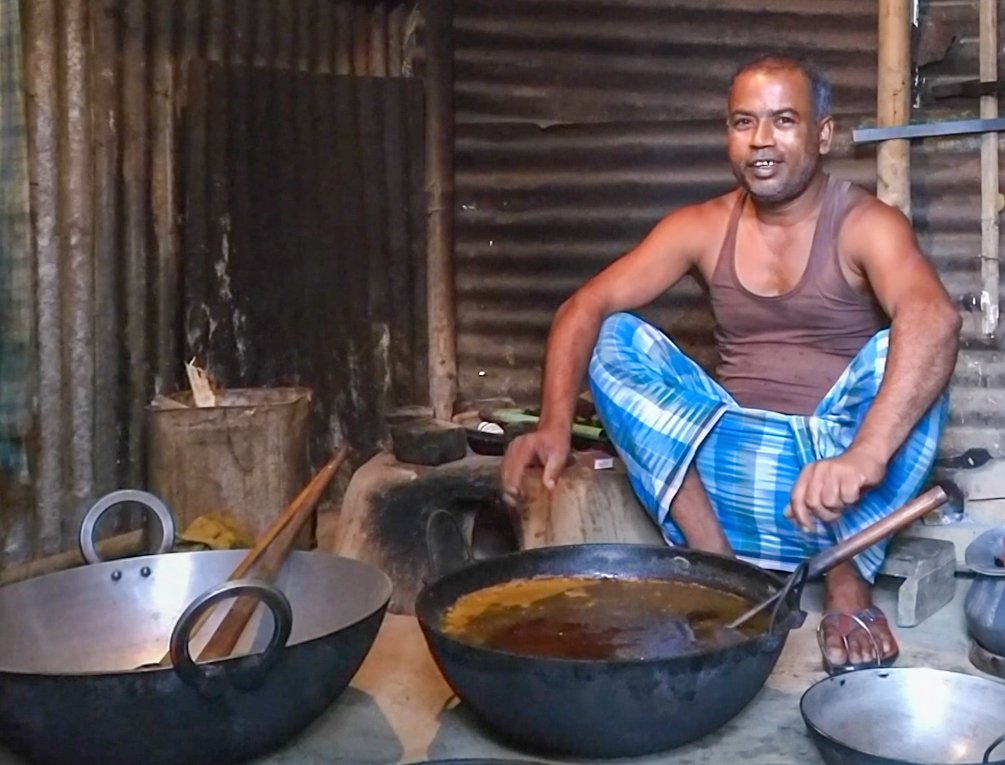
Two decades ago, marriage opened for him the opportunity to learn from his wife Bali Khatun's family the skill of making sweets
Meals now included warm rice, vegetables, fish or meat curry – not the
pantabhat
(fermented rice) given by his previous employer. “If I accompanied them to the market, I would get a treat of
rosogolla
. And new clothes for Eid. I felt like their own family member.”
But his father had other plans. Nosumuddin, by then around 17, was sent to another house after two years, this time back in his own village, Urarbhui. The chief of the village panchayat employed him at an annual salary of Rs. 1,500 and the usual sacks of rice at the end of the harvesting season.
Another year went by.
“I often wondered it I would live all my life as a slave. But I saw no other options,” Nosumuddin says. Still, he held on to hope – and nurtured a dream of working on his own. He had noticed that young boys from his village were migrating out by the 1990s – work options were opening up with the government sanctioning infrastructure projects in the region. Young boys were not willing to work as rakhals anymore, and would earn Rs. 300-500 a month working at tea stalls and eateries in towns and cities, and return home with ‘big’ cash.
Nosumuddin would feel restless watching them listening to brand new radios and wearing shiny watches. Some even purchased bicycles. “They wore flared long pants like Amitabh Bachchan and Mithun Chakravarty, and looked healthy,” he recalls. “I would ask them questions to figure out what they do and how they manage. And then I decided to go with them.”
Nosumuddin found out about jobs in Baghmara town in Meghalaya, around 80 kilometres from his village. He secretly inquired about the travel route and made a plan. “I was tense but determined. I didn’t inform anyone at home, worrying that my family members might follow me and bring me back.”
One morning, instead of taking out the cattle for grazing, Nosumuddin began running. “I left with one of the boys with whom I had been chatting about working outside. We ran till we reached the bus stop in Hatsingimari town.” The journey from there to Baghmara took nine hours. “I ate nothing. I didn’t even have enough money for the 17-rupee ticket. I borrowed it from another boy from my village after reaching Baghmara.”
'I often wondered it I would live all my life as a slave. But I saw no other options', Nosumuddin says. Still, he held on to hope – and nurtured a dream of working on his own
At his dream destination, with empty pockets and an empty stomach, Nosumuddin alighted from the bus in front of Romoni Cha Dukaan (Romoni’s Tea Stall). Seeing a lone boy with hungry eyes, the stall owner signaled to him to come inside. Nosumuddin was offered food, a place to stay and a job as dishwasher-cleaner.
The first night was a night of tears for Nosumuddin. He cried thinking about the Rs. 1,000 from his salary still pending with his employer in the village That was his only concern at the time. “I felt very bad. Such a big amount wasted despite my hard work.”
The months passed by. He learnt to clean teacups and plates, and arrange them on a table. He learnt to make piping hot tea. He was paid Rs. 500 a month, and saved it all. “When I had collected 1,500 rupees, I felt it’s time to meet my parents again. I knew that amount would help them a lot. And I was desperate to visit home.”
Once back home, he handed over all his savings to his father. A long-time family debt was cleared and his family, he says, forgave him for running away.
After a month, Nosumuddin returned to Baghmara and found dishwashing-cleaning work in another tea stall for a salary of Rs. 1,000 a month. He was soon promoted as waiter, and would be out in the front serving tea, sweets and snacks – puri-sabzi, parathas, samosas, rasmalai, rasogollas and more – working from 4 a.m. till 8 p.m. All the waiters-workers slept in the eatery itself.
He worked here for around four years, sending money home regularly. When he had saved around Rs. 4,000, Nosumuddin decided to return home.
He bought a bull with his saving and started ploughing on leased land. That was the only work option in his village. Ploughing, sowing, cleaning kept him busy in the field all day.
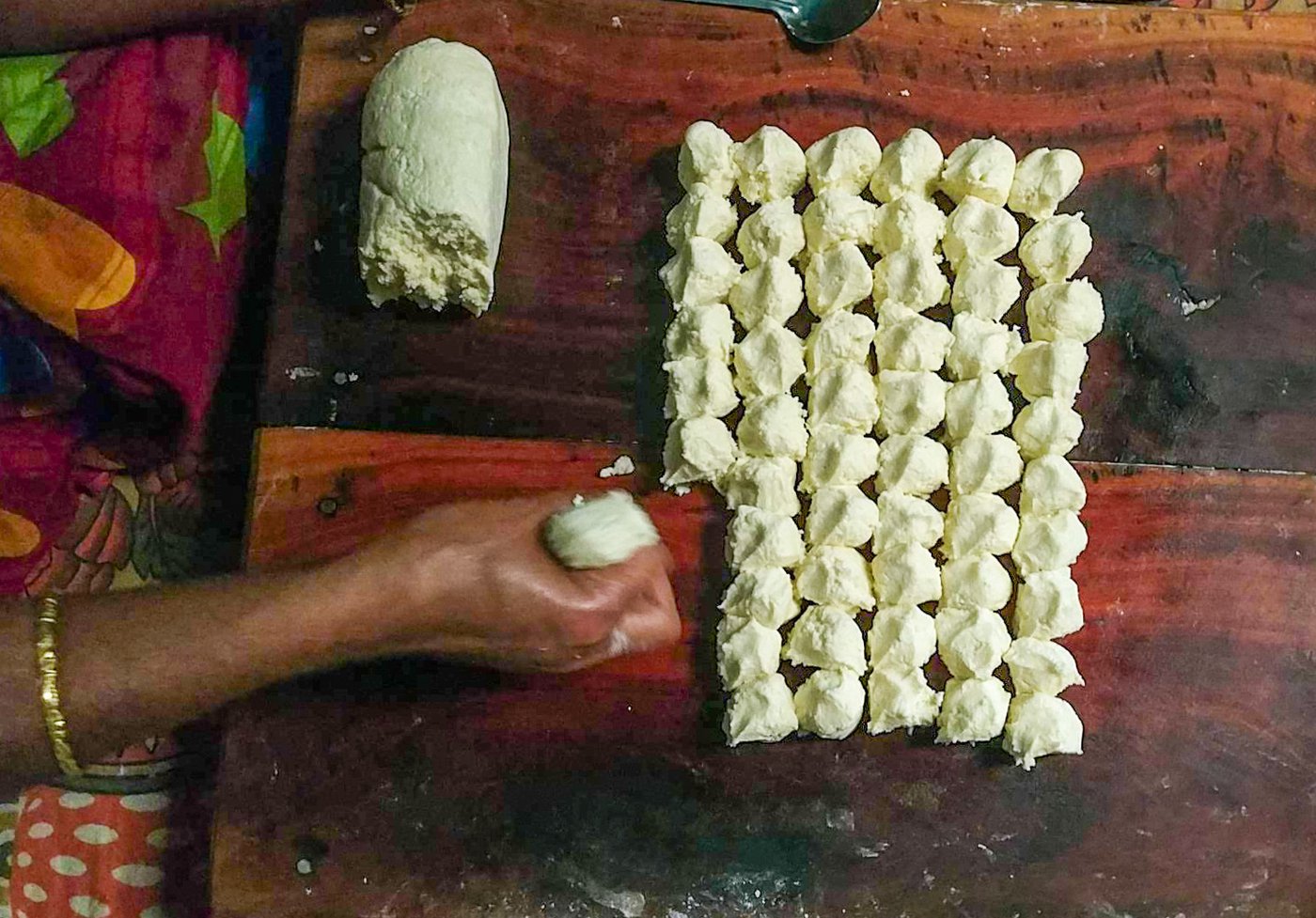
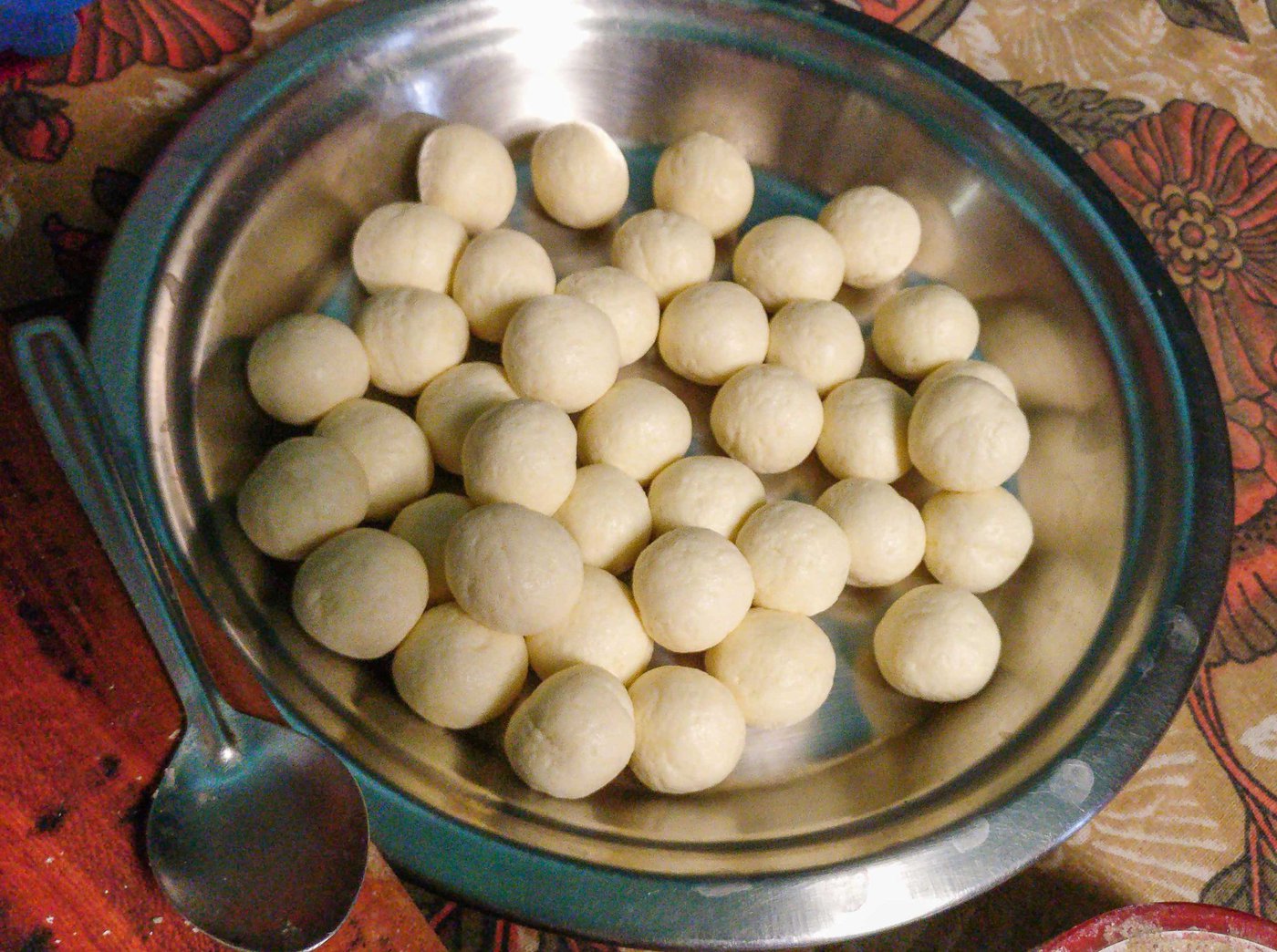
Nosumuddin usually made
rasogollas
in the afternoon or evening – and stored them. But his small (and sweet) world abruptly came to a halt with the lockdown
One morning, a group of
haloi
(
halwai
, sweet-makers) was passing by the field where he was working. “I asked what they were carrying in big aluminum dishes. They said it is
rosogollas
. I came to know that this is a profitable business. I regretted that I had worked in a tea stall where
rosogollas
were made but never learnt how to make them.”
Nosumuddin now wanted to ‘settle down’. “Boys of my age [early 20s] were getting married. Some of them were in love. I felt that I need to find a life partner for myself, build a house and live happily with kids.” He was drawn a woman working on watering a farmer’s fields. He would look at her at work amid the lush green paddy fields. One day, he gathered the courage to approach her. It was disastrous. She ran away and stopped working from the next day.
“I waited to see her again but she never appeared,” he recalls. “Then I talked to my brother-in-law and he started looking for a match for me.” His marriage was arranged with Bali Khatun, now around 35, daughter of a haloi in a nearby village. (Later, he learnt that his first crush was his wife’s aunt.)
Marriage opened for him the opportunity to learn from his wife’s family the skill of making sweets. His first independent attempts began with three litres of milk – he made 100 rasogollas , sold each for Re. 1 going door-to-door, and made a profit of Rs 50.
This soon became his regular source of income. Over time, it allowed him to clear some of his family’s debts and losses in agriculture due to recurring floods or drought.
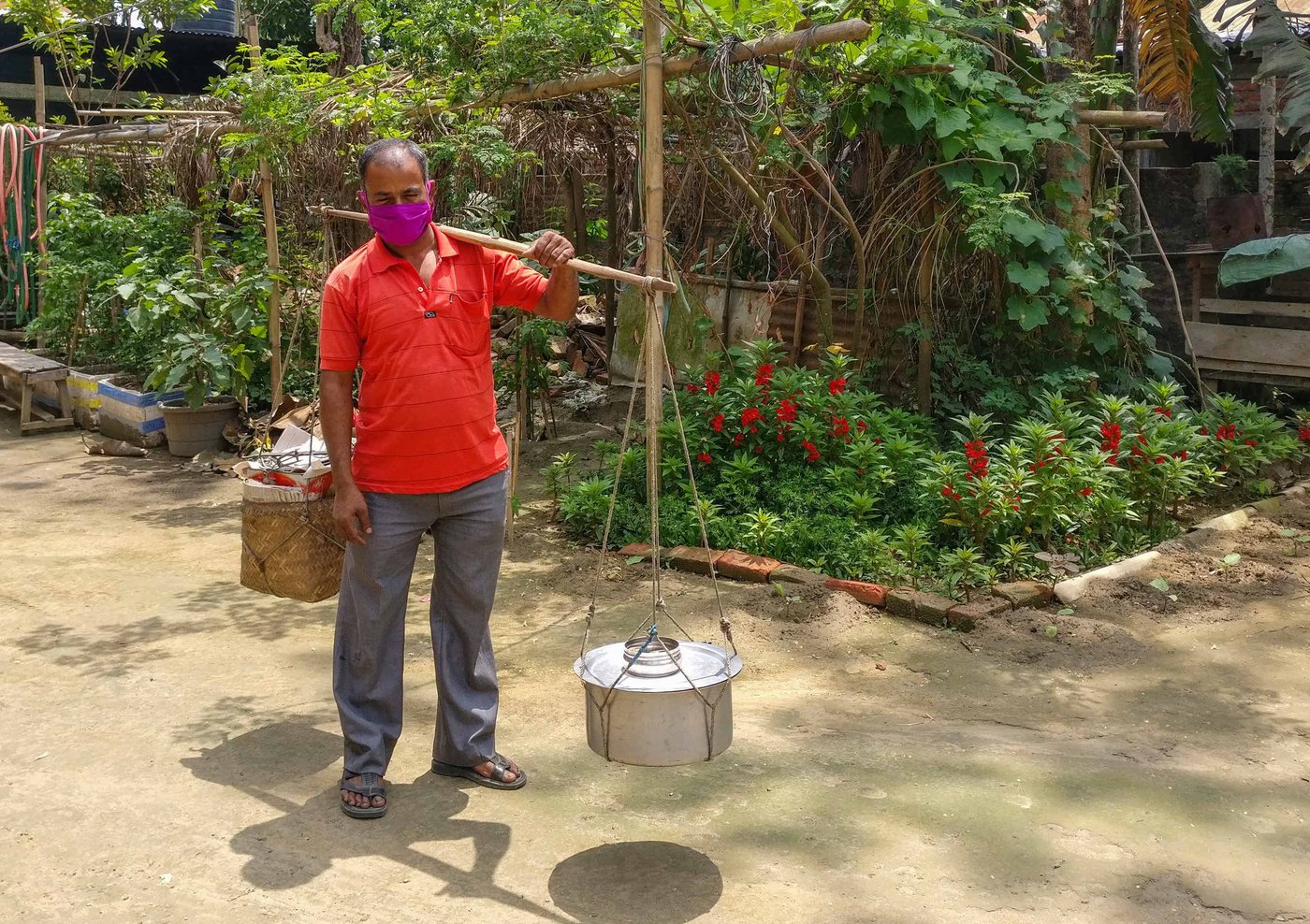
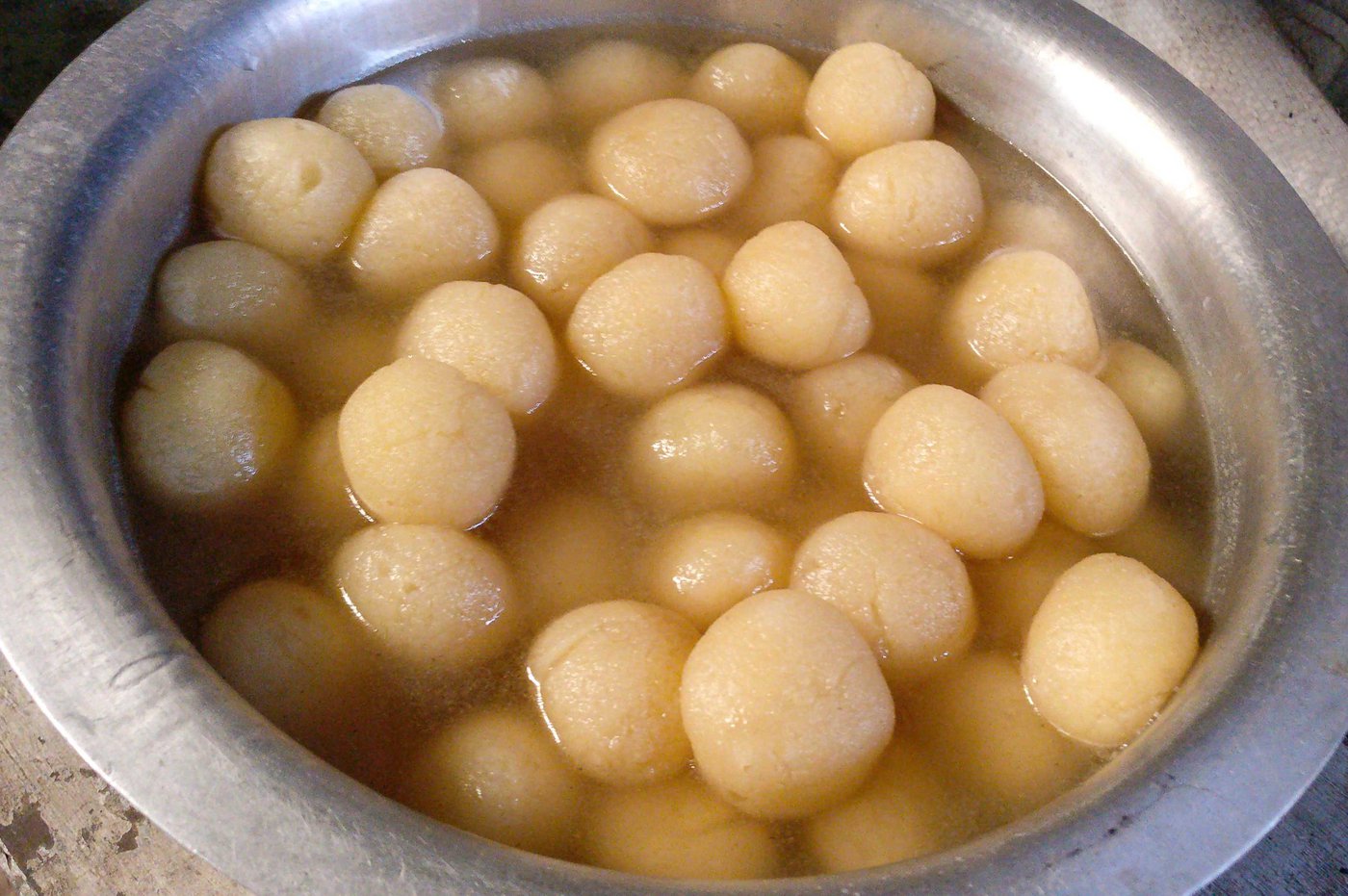
'I walk to nearby villages to sell, sometimes I walk 20-25 kilometres with a load of about 20-25 kilos of sweets'
In 2005, Nosumuddin, by then around 25 years old, travelled to Mahendraganj, roughly 35 kilometres away, a border town in South West Garo Hills district of Meghalaya. He had heard that the sweet business would do well in there. But as a stranger in town, it was not easy. In those days, a series of robberies had created an atmosphere of insecurity. People were wary. It took Nosumuddin three months to find a settled rented space. And almost three years to build a customer base for his sweets.
He didn’t have any capital and started his business on credit, taking all supplies on deferred payment. His wife, Bali Khatun, moved to Mahendraganj in 2015. Over time, they had three children – their daughter Rajmina Khatun is now 18, and sons Foridul Islam and Soriful Islam are 17 and 11, both in school.
For the last few years, Nosumuddin has been making a profit of about Rs. 18,000-20,000 a month. The family’s business has expanded. Along with rasogollas , he and Bali Khatun also makes jalebis .
Nosumuddin would do business 6 or 7 days a week, depending on the season. He and Bali Khatun usually made rasogollas in the afternoon or evening – using 5 litres of milk and 2 kilos of sugar to make 100 white globes – and stored them. Before dawn, they also made jalebis – which have to be sold fresh. Then Nosumuddin would set out with both items, selling them door-to-door or at the village tea stalls, and would return home by 2 p.m.
His small (and sweet) world abruptly came to a halt with the nationwide lockdown due to Covid-19 that began in March 2020. The next few weeks were difficult for the family. They survived on their modest stock of rice, dal, dry fish and red chilli powder. Their landlord helped with further stocks of rice and vegetables. (Since Nosumuddin is a migrant worker in Mahendraganj, he cannot use his ration card here to access relief provided by the government.)
A few days later, he managed to sell
rosogollas
to neighbours who were bored of being at home, and earned around Rs. 800. Apart from this he had no income.
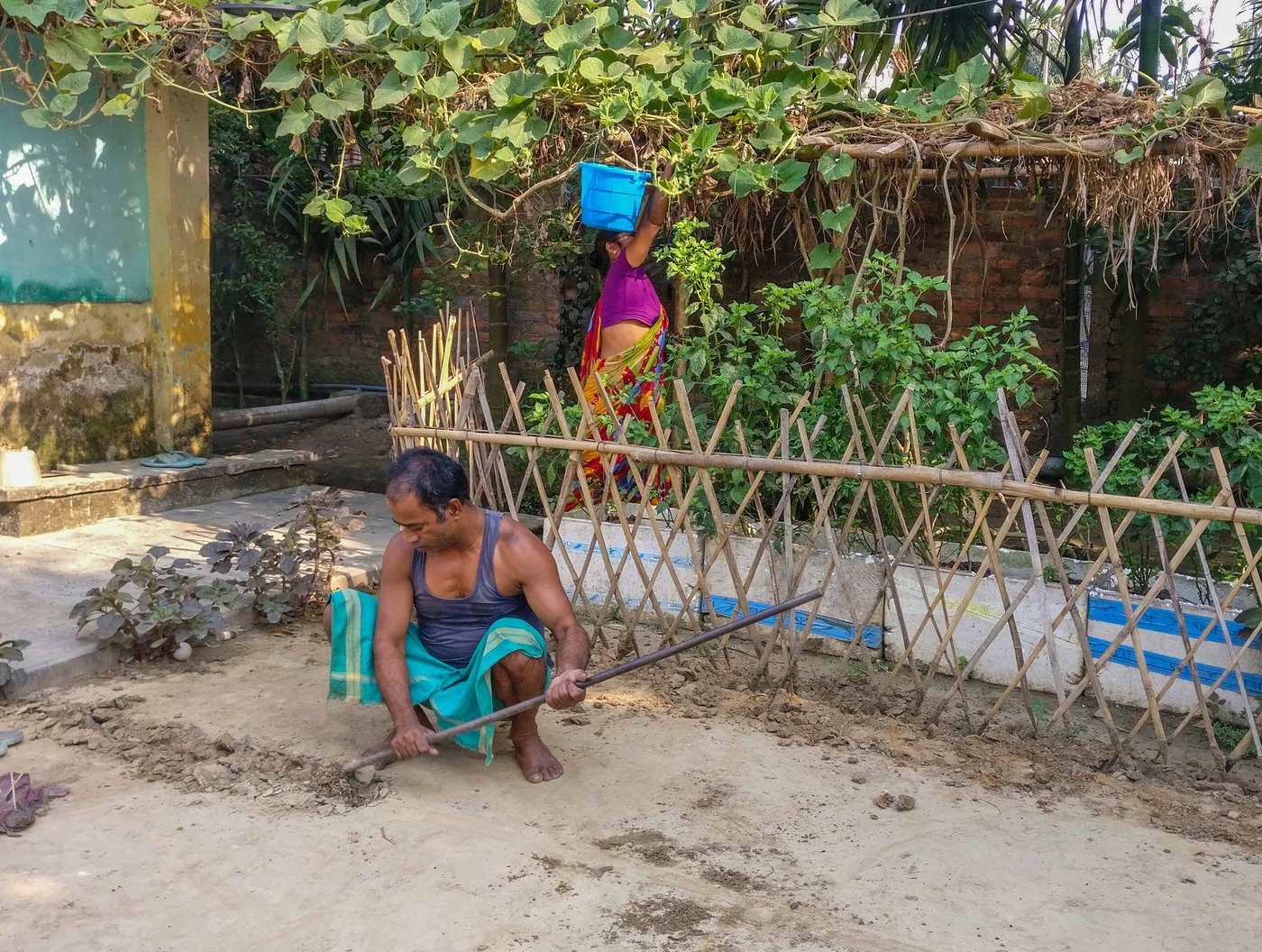
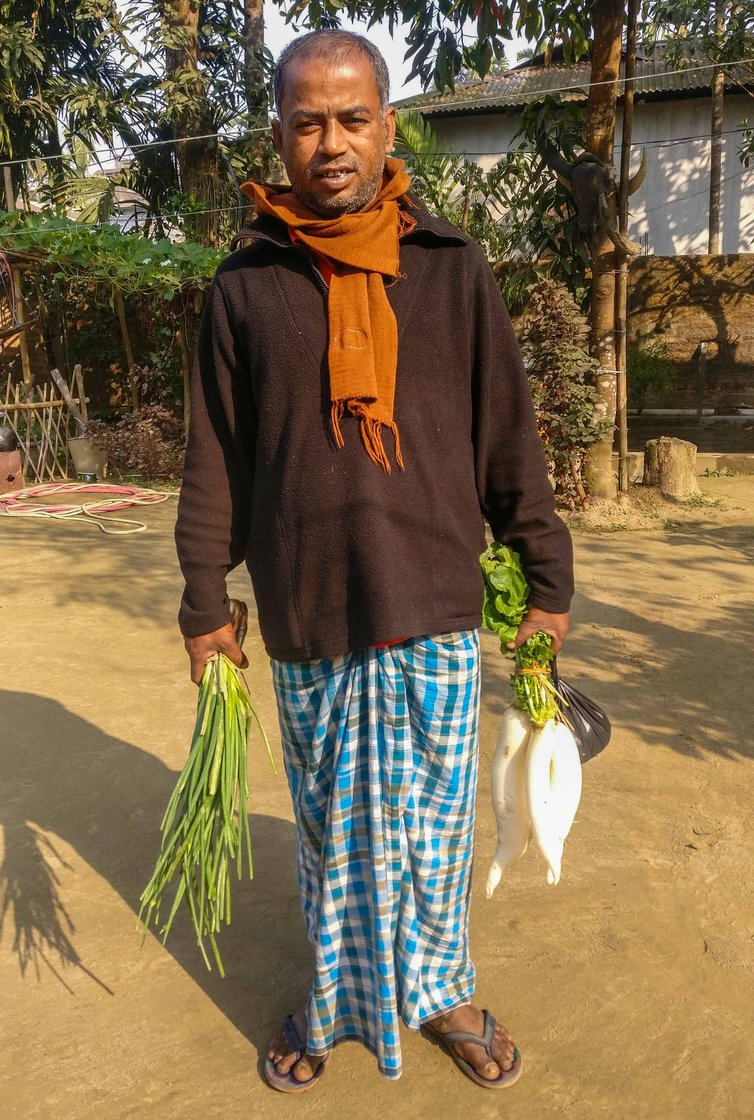
Nosumuddin's income is irregular during the pandemic period: 'Life has become harder. But still not as hard as my childhood...'
A month of lockdown passed by. One afternoon, his landlord wished to have
jalebis
. Nosumuddin made some with whatever ingredients he could put together. Soon neighbours too started asking for
jalebis
. Nosumuddin collected, on credit, some flour, sugar and palm oil from a wholesale grocer living nearby. He started preparing
jalebis
every afternoon, and earned Rs. 400-500 a day.
When the month of Ramzan began in April, the demand for his jalebis soared. Despite the police checkposts during the lockdown he would also, once or twice a week, sell some in the village – carefully masked and sanitised at all times, he says. All this helped him overcome his early lockdown losses and debt.
Once the lockdown was relaxed, he restarted his regular business of rosogollas and jalebis . However, he says, a lot of his income has, over time, been spent on non-serious but persistent health issues faced by his father, wife and daughter.
Towards the end of 2020, Nosumuddin started building his own house in Urarbhui, his family’s village in Assam. This took a chunk of his savings too.
Then came the lockdown in 2021. Nosumuddin’s father was unwell (and passed away in July). His business is often at a standstill now. “My income is not regular during this [pandemic] period,” he says. “I walk to nearby villages to sell, sometimes I walk 20-25 kilometres with a load of about 20-25 kilos of sweets, and am now doing business only 2-3 days a week instead of 6-7 days. I feel tired. Life has become harder during this time. But still not as hard as my childhood. The thought of those days even now brings tears.”
Reporter’s note : Nosumuddin Sheikh, along with his family, has been staying in my parent’s old house in Mahendarganj as a tenant since 2015. Always smiling, he helps my parents and sometimes looks after our kitchen garden.
This story is part of a series of 25 articles on livelihoods under lockdown, supported by the Business and Community Foundation.
